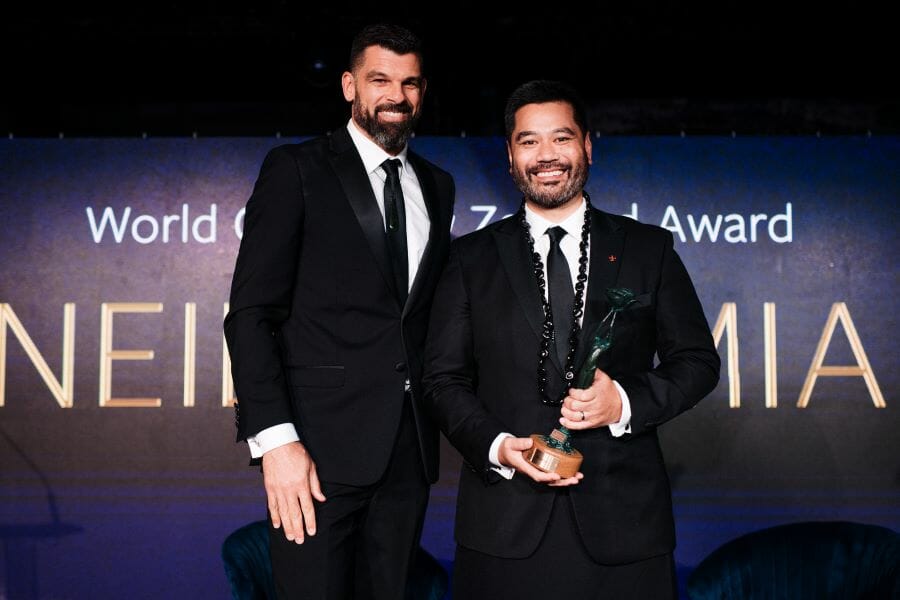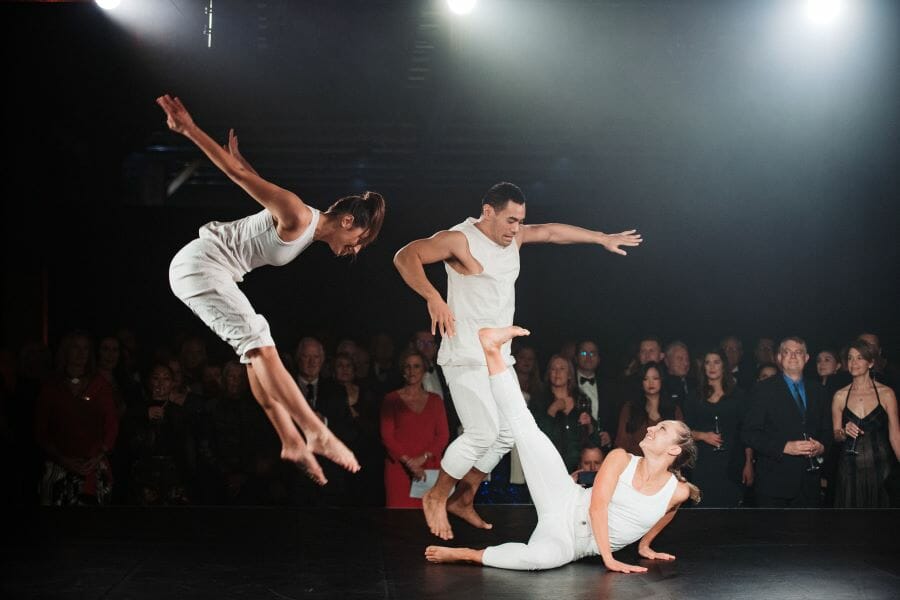2021 Kea World Class Award winner – Neil Ieremia
 Founder and Director Neil Ieremia claims that he called his dance group “Black Grace” because he couldn’t think of a better name. As a kid growing up, Neil and his peers thought of black as ‘brave’, ‘daring’ and ‘cool’. By any measure Ieremia is all of those things.
Founder and Director Neil Ieremia claims that he called his dance group “Black Grace” because he couldn’t think of a better name. As a kid growing up, Neil and his peers thought of black as ‘brave’, ‘daring’ and ‘cool’. By any measure Ieremia is all of those things.
In his final year of training, he was invited to join the prestigious Douglas Wright Dance Company whom he worked for until 1996. Then, motivated to provide a different perspective and a fresh voice in the dance scene, Neil founded his own company, Black Grace, in 1995, with ten male dancers of Pacific, Maori and New Zealand heritage.
That started a chain of events that has changed the face of contemporary dance in New Zealand and turned Black Grace into one of the most recognisable and iconic cultural brands.
His company has toured the length and breadth of New Zealand developing new audiences and a new appreciation for dance. Internationally his work has been presented in the US, the UK, Europe, Asia and Australia,
Numerous ‘firsts’ for a New Zealand choreographer include sell-out performances at Jacob’s Pillow Dance Festival (USA debut 2004 and 2005), a four-week season on New York City’s 42nd Street, performances at the renowned Cervantino Festival in Mexico, the John F. Kennedy Center for the Performing Arts, and the 2010 Cultural Olympiad in Vancouver.
Honolulu proclaimed February 6, 2010 as ‘Black Grace Day’. And, the company was honoured at the Edinburgh Fringe in 2014 with plaudits for the “seemingly inexhaustible energy” of its dancers when reviewed by the New York Times during its 2019 Manhattan season.
Closer to home, The Sunday Star Times review said: ‘Black Grace is the most positive, living expression of any New Zealand art.’

Despite the accolades, Neil Ieremia has never forgotten his roots in Cannons Creek. He remains closely tied to Porirua, which continues to feed his dance work, while his supportive Samoan family provides vital connection and anchorage.
Life in the ‘70 and ‘80s was tough for the Ieremias. He grew up as a state house kid in a working-class suburb and his parents had to work hard to put food on the table. Rheumatic fever at the age of five damaged Neil’s heart and dance provided physical and creative outlets for a boy forbidden to take part in risky sporting activity,
The importance of discipline, courage, and perseverance were all imbued early on. Money was in short supply, but relationships were rich. From his Dad he gained some of his artistic sensibilities and his Mum taught him the importance of careful money management. To someone running his own dance group, that skill has been as good as gold.

Dance was not a socially acceptable path for a young Kiwi male in a rugby-saturated culture. Neil’s family was horrified when he quit his bank job to join a dance school at the age of 19. Mum cried and Dad told him off. Undaunted, Neil took Samoan culture and rugby’s intensity and gave the world movement that is explosive, dramatic and an expression of soaring athleticism. Something that only the supremely fit and gifted should attempt. Dance for a South Pacific sporting nation.
Neil Ieremia’s choreography connects deeply to this country and to everyday experience. His wellsprings are visceral and tackle life lessons head-on. Works like A Letter to Earth were a meditation on mortality as he faced a second heart operation to repair the damage caused by rheumatic fever. Another work, Crying Men, deals with Pasifika expressions of masculinity and family loss.
The subject matter is tough and while he is a compassionate person, practice sessions can be physically brutal. He doesn’t spare his dancers, but like any good leader, is hardest on himself.
He feels a great responsibility to his family, to his culture and to New Zealand and this has weighed on him, especially in earlier days. Looking back, he says, “I became a responsible adult really fast, and I lost my sort of freewheeling, fun self.
“When we got to the Kennedy Center it was amazing; some of my idols had performed there across all sorts of different art forms, and I was gobsmacked. I felt a responsibility to New Zealand to not mess that up!”
The Covid-19 pandemic has been devastating for arts performance worldwide, so once again he’s ‘re-inventing’ Black Grace. Neil confesses he’s not all that confident with technology but faced with the need to tell stories in new ways, he’s hard at work on an immersive experience that will use projections of dancers on a massive and dramatic scale.
The new show, Fa’a (Samoan for “the way of being”) is the culmination of a vision from his earliest days. He says, “when I left art school, I wanted to create work that would be able to cross a whole bunch of different boundaries with all sorts of people; I just thought I wanted it to be as universal as I could make it.” The pilot project launches in June 2021 and he hopes that audiences will start to see and experience it in 2022.
In 2005 Neil Ieremia was made an Arts Foundation Laureate. Ten years later he was awarded the title of Senior Pacific Artist at the Creative New Zealand Pasifika Arts Awards 2015. The following year saw his appointment as an Official of the New Zealand Order of Merit for services to dance in the New Years Honours List.

 MENU
MENU









